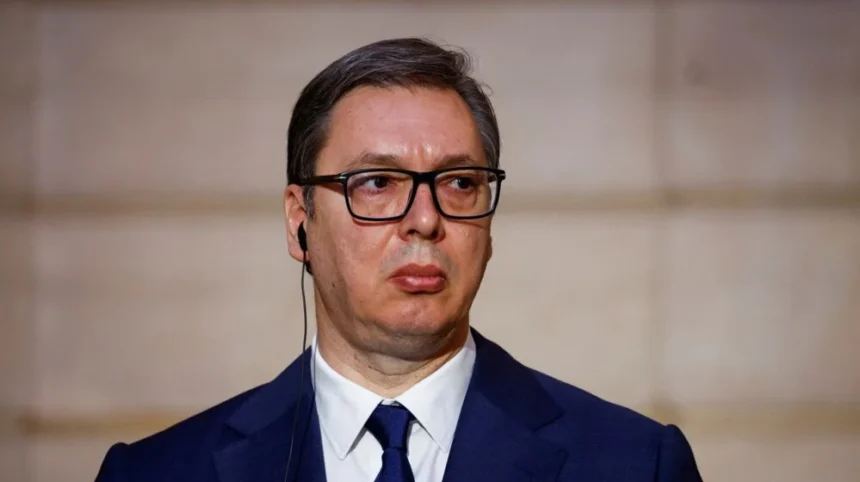What initially appeared as a desperate and coercive move by Vučić, facing the “discomfort” related to prolonged student protests, has now come to fruition—the United States is imposing sanctions on Serbia’s largest oil company, NIS (Oil Industry of Serbia), unless Belgrade relinquishes its entire Russian ownership stake, which amounts to 56.15% (Gazprom Neft, a sister company of Gazprom, holds 50%, and Gazprom itself owns 6.15%), reports Jutarnji List, a Croatian media outlet.
Washington rejected Aleksandar Vučić’s offer to purchase enough shares for Serbia to hold a majority stake, insisting that the Russians must pack their bags and leave for good.
Many believed Vučić was just playing games given the political situation, but when U.S. Ambassador Christopher Hill, who is sympathetic to him, publicly denied it, it turned out to be true. Vučić now has a small hope that, following the upcoming inauguration of Donald Trump, there might be a way to “work something out,” at least extending the deadline to expel the Russians. The homework must be completed by the end of February, or a crisis, shortages, and problems will begin, according to Croatian Jutarnji List.
Another option Vučić is pursuing to mitigate the impending damage is to bring “Brother Xi” (Xi Jinping) into the picture, which led to an immediate meeting with the Chinese Ambassador in Belgrade, Li Ming. The Chinese option is a bit strained and problematic for him, especially with Trump on the horizon, as the Chinese are a bigger red flag for him than Putin. However, if Gazprom does not give up its stake in Serbia’s NIS, sanctions will be imposed on Belgrade, said Vladimir Demidov, an independent oil and gas market expert, to the Russian portal Nevs.ru.
According to Demidov, Serbia will cease receiving oil via the pipeline from Croatia. As a result, he predicts, the media will increasingly alarm the population with fears of gasoline shortages, and the largest refinery in Pančevo will shut down.
Pro-government Russian business outlet RBK reported that the target of these sanctions is not Serbia, but Russia and its energy sector. From the beginning, it was clear that Russia must exit the ownership of Serbia’s largest oil company. It’s unclear why Vučić didn’t act sooner, Demidov questions. He believes Vučić will likely discuss with Russian President Vladimir Putin how to buy out the Russian stake to satisfy everyone.
The portal states that Belgrade is ready to allocate 700 million euros (600 million according to Serbian media) for this, but only if the Russians are willing. According to pro-Russian media, Gazprom remains very secretive about its intentions and whether it even wants to sell its stake.
Both Serbian and Russian media outlets report that this move is unwelcome to Moscow, as it would lose its last “political foothold” in this part of Europe, and Vučić would be freed from dependency on Russia. Serbian analyst and former ambassador to Belarus Srećko Đukić told Beograd’s Danas that imposing sanctions on NIS marks “the beginning of the end for Serbia sitting on two chairs, between the West and Russia,” but that it doesn’t mean the end, rather a hint at the phrase “we want, sorry.”
At the same time, Vladimir Demidov notes that Russia’s exit from the European market threatens to diminish its influence in the region.
Despite the grumbling, Moscow will likely take this step because it has no other option. But the question remains what Vučić will have to promise Putin, as Putin will not give in easily. According to Đukić, selling NIS at a discounted price to the Russians was a political, not a business decision. This, he claims, was a “payment” for Russia’s “guardianship” over Kosovo and its veto in the UN Security Council. Now, the situation is complicated, as Serbia’s policy cannot predict political events and create secure deals, Đukić emphasizes.
Some Serbian and Russian pro-government portals speculate that Vučić and Putin could talk on January 27 due to this situation, if not meet in person. Putin would like Vučić to visit and kiss his ring, as he has been inviting him to Moscow for some time. Vučić’s refusal to attend the BRICS summit in Kazan last summer still irks Putin. Now, there may be an opportunity to resolve this. Moreover, Putin holds a crucial trump card—Kosovo—since the “patriotic” opposition is already pressuring Vučić, and if Serbia loses Russia’s support, it will be left alone in the face of Western pressure on this issue, possibly even on NATO membership.
However, this might mark the beginning of Vučić’s definitive pivot to the West, particularly the EU, not only because it reduces Russian influence and pressure—this has been the main goal of U.S. policy—but also because he likely believes that in this tricky moment, with protests sweeping the streets, Washington and Brussels may prefer to “keep him in power” if necessary, as Moscow no longer has much leverage to help him. Vučić could thus become the “darling dictator,” and with lithium and munitions, Ukraine might turn a blind eye. However, he’s cornered and must deal with the Russian stake in NIS.
But there’s one more intriguing angle. Immediately, the question arose about which foreign oil companies would rush into NIS once the Russians leave. Serbian media have timidly mentioned several Western oil giants, such as ENI, Shell, Total, and CNPC. But the most frequently cited potential strategic partner is the controversial Hungarian MOL, which could seize the opportunity due to Vučić’s brotherly ties with Viktor Orbán.
Beyond the business implications, this would also be a significant “political intrusion” into the Balkans. The Hungarians would practically control the energy market in this part of Europe, and how INA will fare in this final outcome remains to be seen. However, many Serbian analysts believe that the new strategic partner for NIS, after the Russians leave, could likely be an American company.
Especially since James O’Brien, the U.S. “Sanctions Coordinator,” assured Belgrade that there shouldn’t be any problems with oil supplies. However, Orbán’s foreign minister, Peter Szijjártó, criticized U.S. energy sanctions against Russia, stating that Central and Southeastern European countries will bear the brunt, and oil prices will rise globally. According to Moscow’s RBK, as many as two thousand oil companies worldwide have some “Russian stake,” and the goal of the latest sanctions package is to “reduce it to zero.” NIS is first in line. Vučić has 40 days left. Meanwhile, the student protests continue, and his time is running out.







